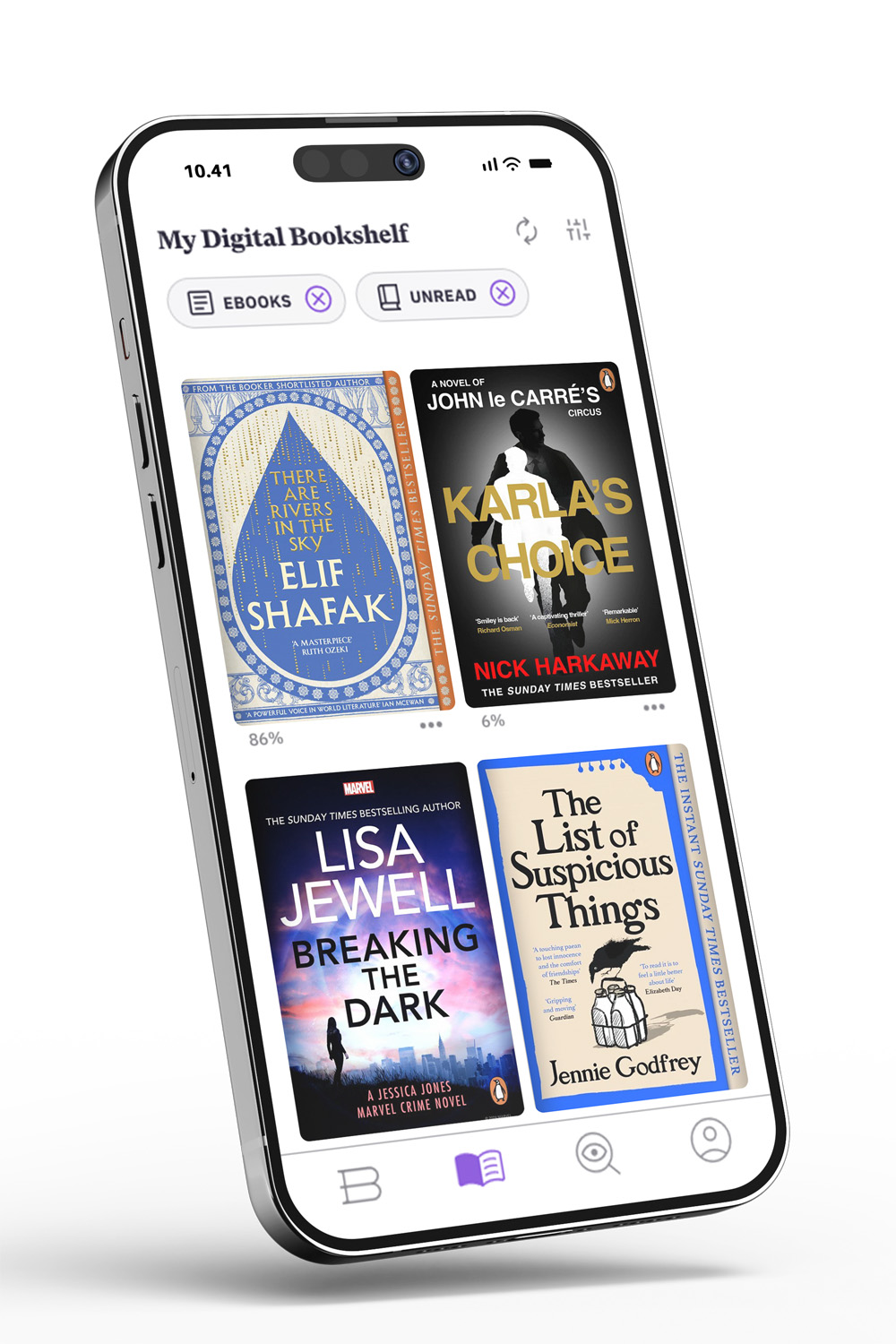
Bookshop.org Is Launching eBooks – Here’s How It Works
By
5 months ago
The UK’s ethical books marketplace has a new digital offering
We all hail the unparalleled experience of print: cracking the spine, turning the page, sniffing the fresh scent wafting off the pages. But physical books are expensive (on average bursting through the £10 barrier in 2022), as well as being bulky – two issues solved by eBooks, which can be priced as low as 99p. But with our ethical hats on, where does this leave authors, publishers and booksellers? In dire straits – prompting ethical bookselling platform Bookshop.org to step in.
Now celebrating its fifth anniversary, Bookshop.org launched in 2020 to counter Amazon’s dominance in the bookselling sphere and to redirect funds back to independent bookshops. Every book sold on Bookshop.org channels funds to independent bookstores, and shoppers can even choose the specific shops they’d like to support. Since its launch, Bookshop.org has generated more than £4 million for UK bookshops – a real gamechanger. A registered and award-winning B Corp, last year Bookshop.org underscored its commitment to the planet by launching Bookloop, a free-to-use buy-back service enabling booklovers to offload their unwanted tomes in exchange for credits to redeem against new books ordered from Bookshop.org.
And now as of 1 October 2025, Bookshop.org is expanding its remit to eBooks – a striking move. We picked the brains of Bookshop.org’s UK MD Nicole Vanderbilt to find out the why, how and the who benefits of this latest move.
Bookshop.org’s eBooks: How Does It Work?
eBooks are now available to shop on Bookshop.org, and just like Kindle and Kobo, readers can enjoy special digital deals with some titles priced as low as 99p. The difference here, however, is that the funds will be funneled to real bookshops, furthering the marketplace’s mission which ‘remains the same as when we launched five years ago,’ Nicole Vanderbilt tells us: ‘to support indie bookshops in the age of ecommerce’.
As for how it works, there is little difference from the standard Bookshop.org experience: ‘A customer can come to our site, choose a bookshop to support from our map, and buy an eBook of their choosing from our catalogue of over one million titles,’ Nicoles explain. ‘The customer can then read that eBook on our eBook app (available from the Apple or Google Play Store), or online on our web reader.’ If the customer doesn’t select a bookshop, the profits are filtered into Bookshop.org’s shared profit pool, which is distributed across all of the platform’s participating bookshops.
Bookshops can also provide Bookshop.org links to eBooks directly to their customers. In this case: ‘Every time an indie bookshop sells an eBook through our site, 100 percent of the profit will go to the bookshop,’ Nicole adds.
Kindle and Kobo users, don’t get too excited just yet: it’s not yet possible to transfer every digital title purchased from Bookshop.org to your existing device. ‘Publishers understandably have strict and significant requirements around the digital rights management protection of their eBooks,’ Nicole explains. ‘As a result of this, it’s not as easy to move these files across apps and devices. For example, Amazon has developed their own proprietary digital rights management software, and they decide which DRM-protected titles will appear on their devices.’
Sadly (though expectedly) Amazon has not given Bookshop.org the greenlight, though Nicole teases they are ‘in talks with Kobo,’ with the more ambitious goal of launching the bookseller’s own ‘eInk device’ hopefully in Bookshop.org’s future.
‘That said, there are many titles that are DRM-free and those eBook files can be moved over to the app or device of the user’s choosing,’ Nicole adds.
Why Has Bookshop.org Launched eBooks?
As a seller of physical books, why is Bookshop.org taking on giants like Amazon and Kobo to sell eBooks? ‘The eBook market is a healthy portion of the book market, valued at £298 million by a recent Publishers Association report,’ Nicole says. ‘In a recent YouGov poll, 40 percent of readers said they’d read an eBook in the last 12 months and 25 percent said it was the main way they read. The problem is that until now, readers have been forced to buy those eBooks primarily on Amazon, with no option available to support an indie bookshop. With our launch, all of that changes.’
Bookshop.org launched in 2020 to disrupt Amazon’s dominance in bookselling and redistribute the profits to independent booksellers, which ‘many people thought was completely insane,’ Nicole reflects. ‘In so many ways, Amazon has taught consumers to expect things fast and cheap at whatever cost that comes to their workers, their partners and the planet. We are delighted to have proven that many people are willing to pay closer to retail price in the interest of supporting these amazing local indie bookshops.’
So too will Bookshop.org’s eBooks support the British highstreet. ‘Our mission is to support indie bookshops, and we believe that we can help them meet their customers where they are,’ Nicole says. ‘First we provided a platform that afforded their customers a world-class ecommerce experience to order physical books for home delivery. This comes with none of the expense, expertise or hassle required of the booksellers running it themselves. Now, we are helping them sell eBooks to those readers who prefer them.’
Backdropped by a landscape of ever-increasing operating costs and reduced footfall, the booksellers Bookshop.org works with have welcomed this move with open arms – predominantly because customers and communities now have ‘one less reason to turn to Amazon’.
‘In a world where we don’t want billionaires controlling our literary culture or our reading lives, this matters,’ Nicole says. ‘As an almost £300 million market in the UK, eBooks are also a big market that will mean essential additional income to these important businesses.’
One such bookseller is Nic Bottomley, the man behind Mr B’s Emporium in Bath, who says he is ‘thrilled’ at the news. ‘Our true love might be print, but eBooks are an important part of the lives of so many readers and it’s going to be fantastic to add into our mix a seamless eBook service, by working in collaboration with Bookshop.org,’ Nic says.
‘As a bookseller, making books even more accessible while still supporting independent shops is nothing but great news!’ adds CP Hunter, co-owner of The Folkestone Bookshop, adding: ‘As a reader who travels a lot, being able to access e-books from more platforms than just my local library is brilliant, and even more exciting that it’s from the ethical platform that is Bookshop.org.’
‘We wish we could have gotten to this even sooner,’ Nicole says. ‘But even though we are a tech start-up we haven’t taken venture capital funding. We remain a very small but very committed team – with a very long list of things to do we know could help bookshops.
Indeed, as well as having ambitions towards their own eReader in the future, Nicole hints Bookshop.org will be adding audiobooks to its catalogue from spring 2026. And if you’re wondering whether UK readers will buy into it all, we can look across the Atlantic, where the initiative launched in 2024. ‘The response has been incredible – much better than we expected even,’ Nicole says. ‘We are one year ahead of plans there, and have already sold more than $1 million in eBooks in the first 6 months.’ In the US, eBooks now make up five percent of Bookshop.org’s sales.
Likewise, while pitting ‘a pretty tiny, mission-driven B-Corp’ like Bookshop.org head-to-head with billionaire corporations like Amazon is certainly not easy, there are some industry processes that make this whole eBook transformation slightly easier. ‘With eBooks, the dynamics shift slightly,’ Nicole says, pointing out that eBooks level the playing field when it comes to delivery speeds. And as for those tempting 99p prices from Amazon, Bookshop.org is ready and raring to step up to the plate. ‘Most of the major publishers work on what the industry calls an agency model for eBooks,’ Nicole explains. ‘What this means is that the publishers (not the retailers) set the selling price for an eBook, and all retailers have that price available to them. So for the first time, indie bookshops will very regularly be on equal price footing with Amazon.’ Of course this is great news for customers too, who often turn to eBooks as a cheaper alternative to skyrocketing paperback and hardback prices, the latter creeping up as high as £25 RRP recently.
Reaching this milestone as the website turns five years old is ‘so rewarding,’ Nicole says. ‘We have generated almost £4.5 million in profit for indie bookshops to ensure they continue to thrive in the age of ecommerce and when technology plays such an important role in our lives, for better or for worse. I am hopeful that this step demonstrates our vision and commitment to supporting bookshops and giving their customers fewer reasons to have to turn to Amazon.’
eBooks are available to shop now at Bookshop.org























